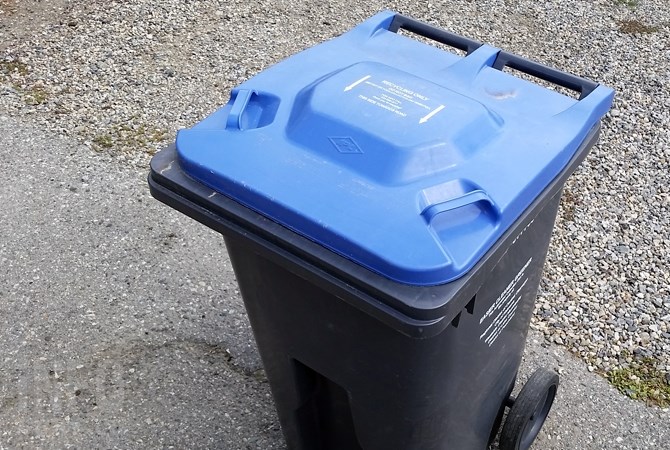
Image Credit: FILE PHOTO
September 18, 2018 - 3:30 PM
CENTRAL OKANAGAN - If Central Okanagan residents don’t stop contaminating their blue recycling bins, they could be fined instead of having their bin left un-emptied with a red tag on it.
“We’re not fining at this time,” Regional Waste Reduction Co-ordinator Cynthia Coates told Kelowna City Council Monday, Sept. 17. “We do have that opportunity in the future to tackle continual offenders.”
Coates was speaking in response to Coun. Max DeHart who argued that putting two or three “oops” stickers on contaminated recycling bins is not good enough.
In an interview with iNFOnews.ca on Tuesday, Coates re-iterated that there are no plans to start levying fines, which are currently could be $150 every time any of the three curbside garbage, recycling or compost bins are misused.
“We really recognize that people are not trying to be malicious about this,” Coates said. “A lot of it comes down to getting good communication to them and get them educated.”
The appetite to start levying fines on residents may change if local municipalities start getting hit by fines themselves.
Recycle B.C. manages recyclable material in the province and is facing pressure from companies that process the end product to have cleaner material.
China imposed what Coates called the “National Sword” on Jan. 1 of this year, allowing only 0.5 per cent contamination. That meant it stopped taking material from most of North America and Europe.
It forced some cities to stop recycling but Recycle B.C. still has a clean enough product to maintain contracts with processors. But the pressure is on to keep the contamination level to three per cent.
The latest audit for the Central Okanagan is 15 per cent, although Coates expects that rate to come down following 16 weeks of cart monitoring that ended last Friday.
Workers looked inside carts to see if unacceptable material was visible. If it was bad enough — such a fully functional tricycle, bags of garbage, electronics or used oil jugs — carts were left behind, un-emptied.
Coates doesn’t have all the stats compiled for this year’s program but estimates eight to 10 per cent of carts that were inspected were left un-dumped.
Two years ago, in a smaller inspection program, 70 per cent of residents were left with “oops” stickers pointing out they had put inappropriate things in their recycling bins.
In addition to the visual inspections — which only look at the tops of the bins — drivers photograph loads as they are dumped inside their trucks. That results in about 30 letters per day going to residents, reminding them of what is appropriate to put in their bins; basically paper, cardboard, tin and certain rigid plastics.
Some people put clothing, wood, metal, plastic toys, pool noodles, electronics or pots and pans in their recycling bins.
The weirdest thing found in bins – other than the tricycle?
“An entire microwave,” Coates said. “It took up the entire bin.”
Local municipalities are in the process of signing new contracts with Recycle B.C. that take effect Dec. 1. While fines are permitted under the existing contract for loads with more than three per cent contamination, no fines have yet been levied.
The new contract calls for an increase in fines for Kelowna from $5,000 per load today to $20,000 by 2022.
Recycle B.C. currently pays local governments $34 per household per year to collect recyclables. That goes to $35.50 in December but payments could be withheld for each contaminated load to a maximum of 24 loads per year. A load refers to each truck that drops off at Cascade Recovery in Kelowna, where the recyclables are sorted.
Part of the reason for the 15 per cent contamination rate locally is the curbside collection system that allows a mixture of paper, tin and plastic in the same bin. It’s been in place since 2009.
“Recycle B.C. would like to see us at seven to eight per cent,” Coates said. “They want to see that number (15 per cent) go down significantly. They recognize that the automated cart system makes it very difficult, if not impossible, to get to a 3 per cent level.”
So, while there is no talk of levying fines on local residents in the near future, it may all depend on whether Recycle B.C. starts fining local municipalities.
We welcome your comments and opinions on our stories but play nice. We won't censor or delete comments unless they contain off-topic statements or links, unnecessary vulgarity, false facts, spam or obviously fake profiles. If you have any concerns about what you see in comments, email the editor.
News from © iNFOnews, 2018